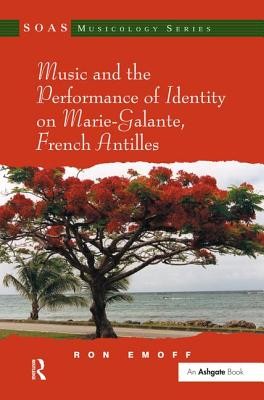
- We will send in 10–14 business days.
- SAVE -10% with code: EXTRA
Music and the Performance of Identity on Marie-Galante, French Antilles (e-book) (used book) | bookbook.eu
Reviews
Description
Marie-Galante is a small island situated in the Caribbean to the south of Guadeloupe. The majority of Marie-Galantais are descendants of the slave era, though a few French settlers also occupy the island. Along with its neighbours Guadeloupe and Martinique, Marie-Galante forms an official département of France. Marie-Galante historically has never been an independent polity. Marie-Galantais express sentiments of being 'deux fois colonisé', or twice colonized, concomitant with their sense of insularity from a global organization of place. Dr Ron Emoff translates this pervasive sense of displacement into the concept of the 'non-nation'. Musical practices on the island provide Marie-Galantais with a means of re-connecting with other significant distant places. Many Marie-Galantais display a 'split-subjectivity', embracing an African heritage, a French association and a Caribbean regionalism. This book is unique, in part, with regard to its treatment of a particular mode of self-consciousness, expressed musically, on a virtually forgotten Caribbean island. The book also combines literary, narrative, historical and musical sources to theorize a postcolonial subsurreal in the French Antilles. The focus of the book is upon kadril dance and gwo ka drumming, two prevalent musical practices on the island with which Marie-Galantais construct unique perceptions of self in relation, specifically, to Africa and France. Based on several extended periods of ethnographic research, the book evokes unique Marie-Galantais views on tradition, historicity, esclavage, nationalism (and its absence) and the local significance of occupying a globally out-of-the-way place. The book will be of interest not only to ethnomusicologists, but also to those interested in cultural and linguistic anthropology, postcolonial studies, performance studies, folklore and Caribbean studies.
EXTRA 10 % discount with code: EXTRA
The promotion ends in 22d.01:42:50
The discount code is valid when purchasing from 10 €. Discounts do not stack.
- Author: Ron Emoff
- Publisher: Routledge
- ISBN-10: 0754665658
- ISBN-13: 9780754665656
- Format: 15.6 x 23.4 x 1.3 cm, kieti viršeliai
- Language: English English
Marie-Galante is a small island situated in the Caribbean to the south of Guadeloupe. The majority of Marie-Galantais are descendants of the slave era, though a few French settlers also occupy the island. Along with its neighbours Guadeloupe and Martinique, Marie-Galante forms an official département of France. Marie-Galante historically has never been an independent polity. Marie-Galantais express sentiments of being 'deux fois colonisé', or twice colonized, concomitant with their sense of insularity from a global organization of place. Dr Ron Emoff translates this pervasive sense of displacement into the concept of the 'non-nation'. Musical practices on the island provide Marie-Galantais with a means of re-connecting with other significant distant places. Many Marie-Galantais display a 'split-subjectivity', embracing an African heritage, a French association and a Caribbean regionalism. This book is unique, in part, with regard to its treatment of a particular mode of self-consciousness, expressed musically, on a virtually forgotten Caribbean island. The book also combines literary, narrative, historical and musical sources to theorize a postcolonial subsurreal in the French Antilles. The focus of the book is upon kadril dance and gwo ka drumming, two prevalent musical practices on the island with which Marie-Galantais construct unique perceptions of self in relation, specifically, to Africa and France. Based on several extended periods of ethnographic research, the book evokes unique Marie-Galantais views on tradition, historicity, esclavage, nationalism (and its absence) and the local significance of occupying a globally out-of-the-way place. The book will be of interest not only to ethnomusicologists, but also to those interested in cultural and linguistic anthropology, postcolonial studies, performance studies, folklore and Caribbean studies.


Reviews